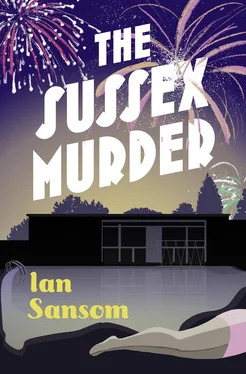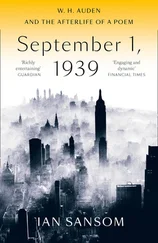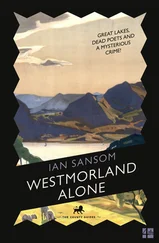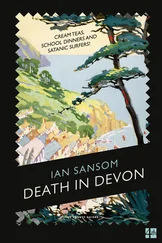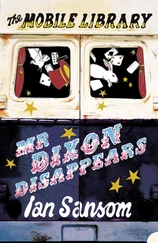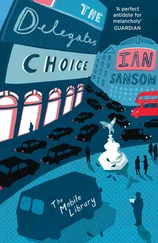‘I can’t say I have, Miriam, no.’
‘ Axis ? Really?’
‘No.’
‘ A Quarterly Review of Contemporary “ Abstract ” Painting and Sculpture ?’
‘Oh,’ I said, ‘that Axis .’
From the teetering pile on the table she plucked the latest issue of the magazine, which I flicked through while she went to finish her packing.
‘That’ll be an education for you,’ she said, as she disappeared into her bedroom.

It certainly was. Most of the articles were entirely – one might almost say immaculately – unreadable, as if written from a strange place where the English language had been entirely reinvented solely to bamboozle and confuse. One contributor, for example, described some blobby sort of a painting as ‘rampageous and eczematous’; another described an artist whose work consisted entirely of everyday household objects hung on washing lines as having ‘traversed the farthest realms of the aesthetic to reinvent the very idea of objecthood’; Miriam’s article was perhaps marginally less preposterous than the rest, though equally vexatious. She described some artist’s series of abstract sketches as a work of ‘profound autofiction’: to me the work looked like a series of a child’s drawings of black and white squares and triangles balancing on colourful balls.
Miriam’s restless pursuit of knowledge of all kinds was of course quite admirable, her hunger for new experiences rivalling only her father’s great lust for learning. Having endured a privileged, if rather peculiar upbringing and education at some of the country’s best schools, and courtesy of one of the country’s best minds, Miriam often expressed to me her wish that she had gone to Cambridge or to Oxford to study PPE (which, to my shame, I usually referred to as GGG, or ‘Ghastly Girls’ Greats’, an easy alternative to Classics). ‘All these women who go to Lady Margaret Hall do make one feel terribly inadequate, Sefton.’ During our work together on The County Guides , Miriam slowly but surely reinvented herself, becoming more and more an autodidact in the manner of her father: she went to fewer tennis parties with girls called Diana and Camilla, took up the saxophone and the uilleann pipes, added Arabic and Mandarin Chinese to her many languages, and ranged widely in her reading, from Freud in German to Céline in French. She was naturally formidable: over time she became utterly extraordinary. It was sometimes difficult to see how anyone could possibly keep up with her.
When I occasionally asked why she had taken up with this unsuitable man or other, she would simply say, ‘Because everyone else is so boring, Sefton.’ Boredom was her bête noire . It could get her into terrible trouble. Her most recent boyfriend was a man so daring and adventurous that he had joined Britannia Youth, the neo-fascist group that specialised in sending impressionable young British schoolboys to Nazi rallies in Germany.
‘Roderick was just such fun!’ she said.
Roderick had lasted about two weeks.

‘Right,’ she said, barrelling out of her bedroom carrying a large handbag.
‘Crocodile?’ I nodded towards the bag.
‘Alligator, actually, Sefton. Can’t you tell? Are you ready?’
‘I am. Is that all you’re taking?’ I was confused. Miriam did not travel light. Part of the challenge of travelling with Miriam and Morley was travelling with Miriam’s clothes: for even the shortest journey she would pack Chinese robes, leopard-skin hats and kid leather gloves.
‘Yes.’
‘That’s it?’
‘The rest is already in the Lagonda, Sefton. László gave me a hand last night. Do you know László?’
‘I don’t think I do, no.’
‘You must know László.’
Miriam was always amazed when it turned out that I didn’t know anyone she knew – because of course she knew everyone who counted. I did not, however, to my knowledge, know anyone named László.
‘Bruno?’
‘No.’ As far as I was aware my life was both László- and Bruno-free.
‘Serge?’
Ditto.
‘Anyway, lovely chaps. They got the Lagonda all packed up for me. Now, what do you think?’ She gestured towards a brooch she was wearing.
‘It’s very pretty.’
‘Pretty, Sefton?’
‘Very pretty.’
‘Very pretty? For goodness sake, man, it’s a nineteenth-century Tiffany orchid brooch with diamond-edged petals.’
‘Yes, I thought so. And very pretty.’
‘It was a gift from a friend, actually.’
‘Very good.’ Miriam was forever receiving gifts from friends, always men – and always jewellery, though once there was the gift of a De Dion Bouton car, which for a moment rivalled the Lagonda in her affections. The men came and went but the gifts remained.
‘Do you know, Sefton,’ she told me on more than one occasion, ‘the perfect condition for a woman is either to be engaged, or to be widowed.’
We were about to leave the apartment, Miriam equipped with bag and key in hand.
‘Oh, I almost forgot.’ She dashed back into her bedroom and reappeared moments later carrying what looked like a small furry blanket clutched to her chest.
‘What is that?’
‘It’s a Bedlington, Sefton.’
‘A Whatlington?’
‘A Bedlington. A Bedlington Terrier.’
‘A dog?’
‘Yes, of course a dog.’
‘Oh, Miriam.’
‘What do you mean, “Oh, Miriam”?’
‘A dog , Miriam.’
‘I like dogs, Sefton.’
‘You didn’t get it at Club Row?’
‘I certainly did,’ said Miriam, offended. ‘There was a chap as I was leaving the market who was packing up for home and he had this little thing all on his own and—’
‘From Club Row? You’ll be lucky if he lasts a week,’ I said.
‘Sefton!’ She covered the dog’s ears. ‘Don’t talk like that around Pablo.’
‘Pablo?’
‘Picasso, yes.’
‘You’ve named your dog after the artist.’
‘Yes. Why shouldn’t I?’
A dog that looked less like Picasso it would be hard to imagine: he was a dog that looked like a Picasso. Everything about him was wonky, or wrong: rather than a dog, he resembled a lamb, except he was a lamb with a bluish, velvety sort of coat, a high arched back, a narrow but bulbous head, a tail that tapered to a point, and ears that hung down to what looked like two little white pom-poms. He had a mild, bewildered expression on his face and was without a doubt one of the most peculiar-looking creatures I’d ever seen. Miriam obviously adored him.
‘Take these,’ she said, thrusting a brown paper bag into my hands. ‘The chap threw in a bag of arrowroot biscuits.’
‘Marvellous,’ I said.
‘Now. Pablo has left a little present in the bedroom.’
‘Oh no.’ So this was the source of the smell.
‘And I just wondered if you’d be a darling and tidy it up, while I run down to the car? There’re some old newspapers in there that should do the job.’
‘Miriam!’
‘Thank you, darling! See you in a min!’

Pablo’s gift duly disposed of, I made my way down to the Lagonda, which was parked at the back of the building.
Miriam had donned her leather driving gloves.
‘Are we not waiting for your father?’ I asked.
Читать дальше
